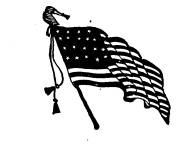Ohio History Journal
SINCLAIRE'S DEFEAT.
[This specimen of early times poetry
appeared shortly after St. Clair's defeat
(1791) and was printed in circular form,
it is related, and was posted up in many
a pioneer cabin. It reveals the
sentiment of the times as well as the Form of ex-
pression.]
'Twas November the fourth, in the year
ninety-one,
We had a sore engagement near to Fort
Jefferson;
Sainclaire was our commander, which may
remembered be,
For there we left nine hundred men in
the West'n Ter'tory.
At Bunker's Hill and Quebec, there many
a hero fell,
Likewise at Long Island (it is I the
truth can tell),
But such a dreadful carnage may I never
see again
As hap'ned near St. Mary's, upon the
river plain.
Our army was attacked just as the day
did dawn,
And soon were overpowered and driven
from the lawn.
They killed Major Ouldham, Levin and
Briggs likewise,
And horrid yells of sav'ges resounded
through the skies.
Major Butler was wounded the very second
fire;
His manly bosom swell'd with rage when
forc'd to retire;
And as he lay in anguish, nor scarcely
could he see,
Exclaimed, "Ye hounds of hell! Oh
revenged I will be."
We had not been long broken when General
Butler found
Himself so badly wounded, was forced to
quit the ground;
"My God!" says he, "what
shall we do? we're wounded every man;
Go charge them, valiant heroes, and beat
them if you can."
He leaned his back against a tree, and
there resigned his breath,
And like a valiant soldier sunk in the
arms of death;
When blessed angels did await his spirit
to convey,
And unto the celestial fields he quickly
bent his way.
We charg'd again with courage firm, but
soon again gave ground;
The war-whoop then redoubled, as did the
foes around.
They killed Major Ferguson, which caused
his men to cry,
"Our only safety is in flight, or
fighting here to die."
(376)
